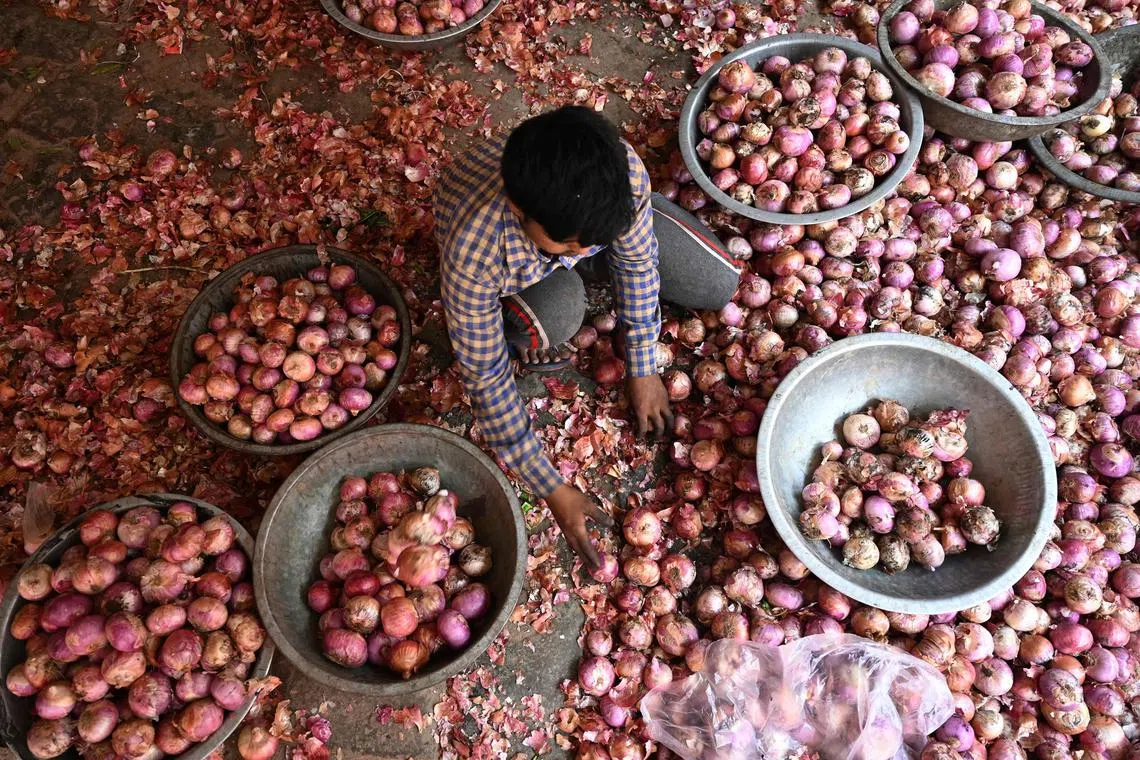India imposes 40% export duty on onions with immediate effect to calm rising prices
Sign up now: Get insights on Asia's fast-moving developments

The export duty on onions will be in place up to Dec 31 as India attempts to improve domestic availability of the vegetable.
PHOTO: AFP
Follow topic:
MUMBAI - India will impose with immediate effect a 40 per cent export duty on onions up to Dec 31 in an attempt to improve domestic availability of the vegetable, the Ministry of Finance said in a notification on Saturday.
The duty imposed by the world’s biggest exporter of onions will help New Delhi dampen local prices ahead of key state elections later this year but will force Asian buyers to shell out more, as other regional exporters have limited supplies.
“The export duty will make Indian onions more expensive than those from Pakistan, China and Egypt. This will naturally lead to lower exports and aid in reducing local prices,” said Mr Ajit Shah, an exporter based in Mumbai.
Average wholesale onion price in key markets has jumped nearly 20 per cent from July to August, to 2,400 rupees (S$39) per 100kg on concerns that erratic rainfall would lead to lower yields.
India’s annual retail inflation rose sharply to a 15-month high of 7.44 per cent in July from 4.87 per cent the previous month.
“Onions harvested during the summer months are rotting quickly, and the new supplies are being delayed. This situation has prompted the government to take precautionary measures,” said another Mumbai-based exporter.
Food inflation, which accounts for nearly half of the overall consumer price basket, hit 11.51 per cent. Retail food inflation was at its highest since January 2020.
Countries such as Bangladesh, Nepal, Malaysia, United Arab Emirates and Sri Lanka rely on Indian shipments.
Onions are used as the base for traditional dishes across Asia such as briyani in Pakistan and India, belacan in Malaysia and fish curry in Bangladesh.
“The Indian duty would prompt China and Pakistan to raise prices, as they have a limited surplus for exports,” said the second exporter.
Prices of some of the most used vegetables in Indian kitchens – including tomatoes, onions, peas, brinjal, garlic and ginger – have more than doubled in the last few months.
India is heading for its driest August in more than a century, with scant rainfall likely to persist
August rainfall, expected to be the lowest since records began in 1901, could dent yields of summer-sown crops, from rice to soya beans, boosting prices and overall food inflation, which jumped in July to the highest since January 2020.
India surprised buyers in July by imposing a ban on widely consumed non-basmati white rice sales to dampen price rises.
REUTERS

